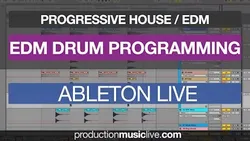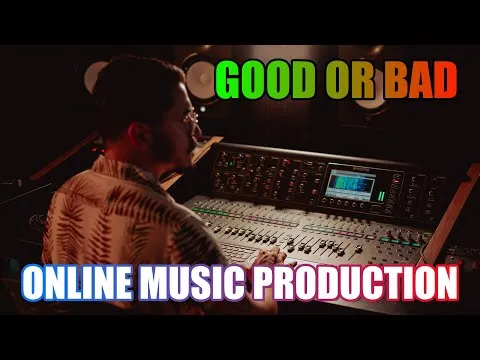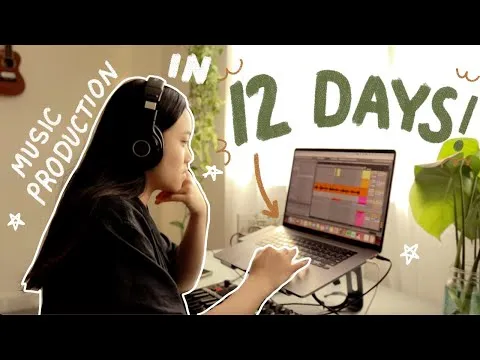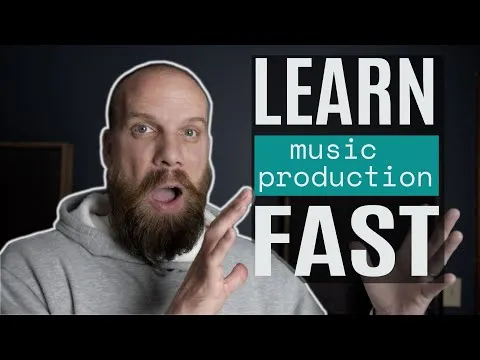
Ableton Drum Beat Programming Tutorials 
This tutorial series provides step-by-step instructions on how to program drum beats in Ableton, allowing users to create their own unique rhythms. ▼
ADVERTISEMENT
Course Feature
![]() Cost:
Cost:
Free
![]() Provider:
Provider:
Youtube
![]() Certificate:
Certificate:
Paid Certification
![]() Language:
Language:
English
![]() Start Date:
Start Date:
On-Demand
Course Overview
❗The content presented here is sourced directly from Youtube platform. For comprehensive course details, including enrollment information, simply click on the 'Go to class' link on our website.
Updated in [April 29th, 2023]
This course provides an overview of Ableton Drum Beat Programming Tutorials. Students will learn how to create drums and beats in Ableton, a powerful music production software. Through this course, students will gain an understanding of the basics of drum programming, including how to create drum patterns, use drum samples, and apply effects. Additionally, students will learn how to use Ableton's built-in tools to create unique and interesting drum sounds. By the end of the course, students will have the skills to create their own drum beats and rhythms.
[Applications]
After completing this course, students should be able to apply their knowledge of Ableton drum beat programming to create their own unique beats and rhythms. They should be able to use the tools and techniques learned in the course to create a variety of drum patterns and sounds. Additionally, they should be able to use the Ableton software to mix and master their beats. Finally, they should be able to use the Ableton software to export their beats to other formats for use in other music production software.
[Career Paths]
1. Music Producer: Music producers are responsible for creating and producing music for a variety of media, including film, television, radio, and video games. They work with artists to create the desired sound and are responsible for the overall production of the music. Music producers are also responsible for mixing and mastering the music, as well as ensuring that the music is of the highest quality. As technology advances, music producers are increasingly using digital tools such as Ableton to create and produce music.
2. Audio Engineer: Audio engineers are responsible for recording, mixing, and mastering audio for a variety of media, including film, television, radio, and video games. They use a variety of tools and techniques to create the desired sound, and are often responsible for the overall sound design of the project. With the increasing use of digital tools such as Ableton, audio engineers are increasingly using these tools to create and produce audio.
3. Music Composer: Music composers are responsible for creating original music for a variety of media, including film, television, radio, and video games. They use a variety of tools and techniques to create the desired sound, and are often responsible for the overall composition of the music. With the increasing use of digital tools such as Ableton, music composers are increasingly using these tools to create and produce music.
4. Sound Designer: Sound designers are responsible for creating sound effects and soundscapes for a variety of media, including film, television, radio, and video games. They use a variety of tools and techniques to create the desired sound, and are often responsible for the overall sound design of the project. With the increasing use of digital tools such as Ableton, sound designers are increasingly using these tools to create and produce sound effects and soundscapes.
[Education Paths]
1. Bachelor of Music Production: This degree path focuses on the technical aspects of music production, such as recording, mixing, and mastering. It also covers topics such as music theory, composition, and sound design. This degree path is ideal for those who want to become professional music producers and sound engineers. Additionally, the developing trend in this field is the use of digital audio workstations (DAWs) such as Ableton, which allow for more creative and efficient music production.
2. Bachelor of Audio Engineering: This degree path focuses on the technical aspects of audio engineering, such as acoustics, signal processing, and sound reinforcement. It also covers topics such as audio production, sound design, and music production. This degree path is ideal for those who want to become professional audio engineers and sound designers. Additionally, the developing trend in this field is the use of digital audio workstations (DAWs) such as Ableton, which allow for more creative and efficient audio engineering.
3. Bachelor of Music Technology: This degree path focuses on the technical aspects of music technology, such as music synthesis, sampling, and sequencing. It also covers topics such as music theory, composition, and sound design. This degree path is ideal for those who want to become professional music technologists and sound designers. Additionally, the developing trend in this field is the use of digital audio workstations (DAWs) such as Ableton, which allow for more creative and efficient music technology.
4. Bachelor of Music Composition: This degree path focuses on the creative aspects of music composition, such as songwriting, arranging, and orchestration. It also covers topics such as music theory, composition, and sound design. This degree path is ideal for those who want to become professional music composers and songwriters. Additionally, the developing trend in this field is the use of digital audio workstations (DAWs) such as Ableton, which allow for more creative and efficient music composition.
Course Provider

Provider Youtube's Stats at AZClass
Discussion and Reviews
0.0 (Based on 0 reviews)
Explore Similar Online Courses

Design Thinking : Customer Journey Mapping

Prepared Statements and Stored Procedures

Python for Informatics: Exploring Information

Social Network Analysis

Introduction to Systematic Review and Meta-Analysis

The Analytics Edge

DCO042 - Python For Informatics

Causal Diagrams: Draw Your Assumptions Before Your Conclusions

Whole genome sequencing of bacterial genomes - tools and applications

online music production course good or bad

I Learn How to Produce Music in 12 DAYS!


Start your review of Ableton Drum Beat Programming Tutorials